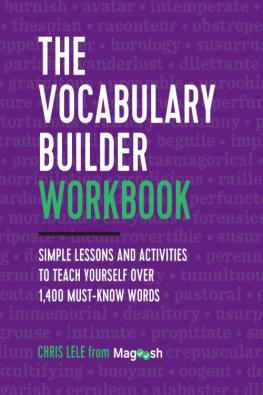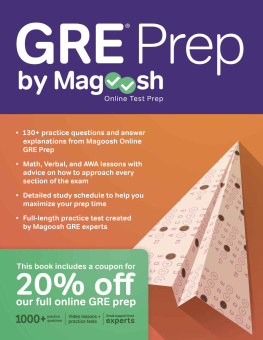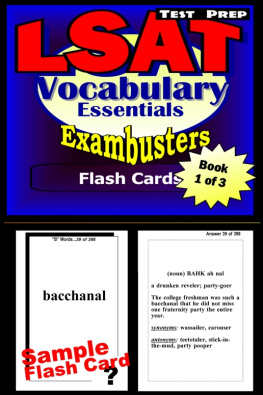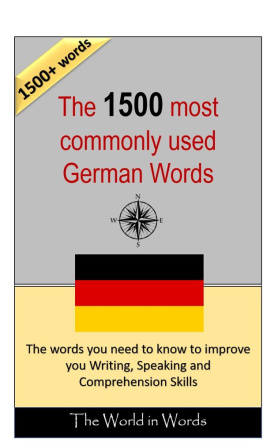
 Copyright 2018 by Chris Lele No part of this publication may be reproduced, stored in a retrieval system, or transmitted in any form or by any means, electronic, mechanical, photocopying, recording, scanning, or otherwise, except as permitted under Sections 107 or 108 of the 1976 United States Copyright Act, without the prior written permission of the Publisher. Requests to the Publisher for permission should be addressed to the Permissions Department, Zephyros Press, 6005 Shellmound Street, Suite 175, Emeryville, CA 94608. Limit of Liability/Disclaimer of Warranty: The Publisher and the author make no representations or warranties with respect to the accuracy or completeness of the contents of this work and specifically disclaim all warranties, including without limitation warranties of fitness for a particular purpose. No warranty may be created or extended by sales or promotional materials. The advice and strategies contained herein may not be suitable for every situation. This work is sold with the understanding that the Publisher is not engaged in rendering medical, legal, or other professional advice or services.
Copyright 2018 by Chris Lele No part of this publication may be reproduced, stored in a retrieval system, or transmitted in any form or by any means, electronic, mechanical, photocopying, recording, scanning, or otherwise, except as permitted under Sections 107 or 108 of the 1976 United States Copyright Act, without the prior written permission of the Publisher. Requests to the Publisher for permission should be addressed to the Permissions Department, Zephyros Press, 6005 Shellmound Street, Suite 175, Emeryville, CA 94608. Limit of Liability/Disclaimer of Warranty: The Publisher and the author make no representations or warranties with respect to the accuracy or completeness of the contents of this work and specifically disclaim all warranties, including without limitation warranties of fitness for a particular purpose. No warranty may be created or extended by sales or promotional materials. The advice and strategies contained herein may not be suitable for every situation. This work is sold with the understanding that the Publisher is not engaged in rendering medical, legal, or other professional advice or services.
If professional assistance is required, the services of a competent professional person should be sought. Neither the Publisher nor the author shall be liable for damages arising here-from. The fact that an individual, organization, or website is referred to in this work as a citation and/or potential source of further information does not mean that the author or the Publisher endorses the information the individual, organization, or website may provide or recommendations they/it may make. Further, readers should be aware that Internet websites listed in this work may have changed or disappeared between when this work was written and when it is read. For general information on our other products and services or to obtain technical support, please contact our Customer Care Department within the U.S. at (510) 253-0500. at (510) 253-0500.
Zephyros Press publishes its books in a variety of electronic and print formats. Some content that appears in print may not be available in electronic books, and vice versa. TRADEMARKS: Zephyros Press and the Zephyros Press logo are trademarks or registered trademarks of Callisto Media Inc. and/or its affiliates, in the United States and other countries, and may not be used without written permission. All other trademarks are the property of their respective owners. Zephyros Press is not associated with any product or vendor mentioned in this book.
ISBN: Print 978-1-93975-481-3 | eBook 978-1-93975-482-0 To my Dad, for showing me the power of words.CONTENTS(n.) kntents  People tend to assume Ive always excelled at words. Im a decent Scrabble player, include SAT words in conversation without realizing it, and do anagrams in my head for fun. Now that Im a vocabulary expert at Magoosh, my innate verbal ability seems like a foregone conclusion. But it wasnt always this way. When I was in middle school, I remember having to study for vocabulary quizzes and dreading the experience. To make matters worse, my father would get excited every time he saw me with the vocabulary book open. Ask me any word, hed exclaim.
People tend to assume Ive always excelled at words. Im a decent Scrabble player, include SAT words in conversation without realizing it, and do anagrams in my head for fun. Now that Im a vocabulary expert at Magoosh, my innate verbal ability seems like a foregone conclusion. But it wasnt always this way. When I was in middle school, I remember having to study for vocabulary quizzes and dreading the experience. To make matters worse, my father would get excited every time he saw me with the vocabulary book open. Ask me any word, hed exclaim.
No matter how many syllables the word contained, hed toss off definitions with aplomb, pressing me for another, the way a small child might ask for candy. I assumed hed always known such words, and that this knowledge came easily to him. Meanwhile, I would be condemned to uttering no more than three-syllable wordsand to poor grades on vocabulary quizzes. I redoubled my efforts at studying, and while my quiz scores did inch up slightly, I felt that my father existed on some vocabulary plane that Id never attain. What I didnt realize then was that my fathers level of knowledge was very much within my grasp, but not from trying to memorize lists of words in a vocabulary book. For thats all our school gave us: books containing lists of words, with no exercises or examples providing context, just dry definitions to be parroted back for a passing grade.
As I grew older, I became an avid reader. First I tried to figure out words in context and then always (and I mean always) consulted the dictionary. Now the previously dry, boring definition contained a special resonance: It unlocked the meaning of a word I had encountered in the wild. And learning words begot more words. Soon, I was actively seeking to grow my vocabulary, picking up books that would offer vivid example sentences, colorful descriptions of a words history, and synonyms galore. While providing riveting reading material (at least for a word lover), these books typically did not contain exercises to reinforce what I learned.
It was only through sheer time and effort that I was able to build a strong vocabulary. What I hope to give to you, the reader, is a book that extends beyond mere examples of words in sentences and word historyhowever colorfuland allows you to engage in activities that reinforce the words youve studied. Using this book, you will learn not merely to parrot a definition but to understand how a word functions in context. That way, you wont only recognize wordsyoull be able to use them yourself. By the time youve completed the lessons and activities in this book, youll be a testament to what took me many years to realize: A large vocabulary is not built from memorizing word lists or from some innate verbal capacity that very few possess, but rather is formed through targeted practice and context recognition. This book is divided into 200 lessons, each featuring six to eight words that fit into the lessons category.
To test your knowledge of many of the words just introduced, youll find a short activity at the end of each lesson asking you to use the new vocabulary in matching, unscrambling, and fill-in-the-blanks exercises. Many lessons have been created by grouping words according to a theme that presents words along a spectrum. For instance, Lesson 17s theme is Only Fools Rush In, which includes words that mean careful and thoughtful, in addition to words that mean careless and reckless. This means that the words featured in each lesson are typically not all synonyms, as that would limit the range of possible activitiesas well as make for dull reading. Additionally, this spectrum allows us to explore the sometimes-subtle distinctions between words. There is no single best way to use this book, as each of us has different needs.
For instance, you might want to start by learning word roots if your vocabulary is not very strong. I find that learning roots is helpful for beginning students of vocabulary, because it allows them to group similar words around a small and thus easier to memorize segment of that word. At the other end of the spectrum, you might already have a strong vocabulary and wonder what in this book will be of value to you. To challenge even the word mavens among us, I have included some very difficult (though not too obscure) words. So as not to alienate beginner and intermediate learners, the words are arranged within each lesson according to difficulty. Each lesson begins with three words, arranged in order from easiest to most difficult.
For each I offer the part of speech, pronunciation, definition, an example of the word in a sentence, etymology (or word history), and finally an interesting tidbit to keep in mind. For the remaining four or five words in the lesson, I provide only the part of speech, pronunciation, and definition. These words are also arranged from simplest to most advanced. The last word of this group is usually a tough one. Indeed, sometimes the final two words are both pretty recondite (yes, that word is included in this book!). The words are followed by an activity to help you gauge your understanding.
Next page








 Copyright 2018 by Chris Lele No part of this publication may be reproduced, stored in a retrieval system, or transmitted in any form or by any means, electronic, mechanical, photocopying, recording, scanning, or otherwise, except as permitted under Sections 107 or 108 of the 1976 United States Copyright Act, without the prior written permission of the Publisher. Requests to the Publisher for permission should be addressed to the Permissions Department, Zephyros Press, 6005 Shellmound Street, Suite 175, Emeryville, CA 94608. Limit of Liability/Disclaimer of Warranty: The Publisher and the author make no representations or warranties with respect to the accuracy or completeness of the contents of this work and specifically disclaim all warranties, including without limitation warranties of fitness for a particular purpose. No warranty may be created or extended by sales or promotional materials. The advice and strategies contained herein may not be suitable for every situation. This work is sold with the understanding that the Publisher is not engaged in rendering medical, legal, or other professional advice or services.
Copyright 2018 by Chris Lele No part of this publication may be reproduced, stored in a retrieval system, or transmitted in any form or by any means, electronic, mechanical, photocopying, recording, scanning, or otherwise, except as permitted under Sections 107 or 108 of the 1976 United States Copyright Act, without the prior written permission of the Publisher. Requests to the Publisher for permission should be addressed to the Permissions Department, Zephyros Press, 6005 Shellmound Street, Suite 175, Emeryville, CA 94608. Limit of Liability/Disclaimer of Warranty: The Publisher and the author make no representations or warranties with respect to the accuracy or completeness of the contents of this work and specifically disclaim all warranties, including without limitation warranties of fitness for a particular purpose. No warranty may be created or extended by sales or promotional materials. The advice and strategies contained herein may not be suitable for every situation. This work is sold with the understanding that the Publisher is not engaged in rendering medical, legal, or other professional advice or services. People tend to assume Ive always excelled at words. Im a decent Scrabble player, include SAT words in conversation without realizing it, and do anagrams in my head for fun. Now that Im a vocabulary expert at Magoosh, my innate verbal ability seems like a foregone conclusion. But it wasnt always this way. When I was in middle school, I remember having to study for vocabulary quizzes and dreading the experience. To make matters worse, my father would get excited every time he saw me with the vocabulary book open. Ask me any word, hed exclaim.
People tend to assume Ive always excelled at words. Im a decent Scrabble player, include SAT words in conversation without realizing it, and do anagrams in my head for fun. Now that Im a vocabulary expert at Magoosh, my innate verbal ability seems like a foregone conclusion. But it wasnt always this way. When I was in middle school, I remember having to study for vocabulary quizzes and dreading the experience. To make matters worse, my father would get excited every time he saw me with the vocabulary book open. Ask me any word, hed exclaim.